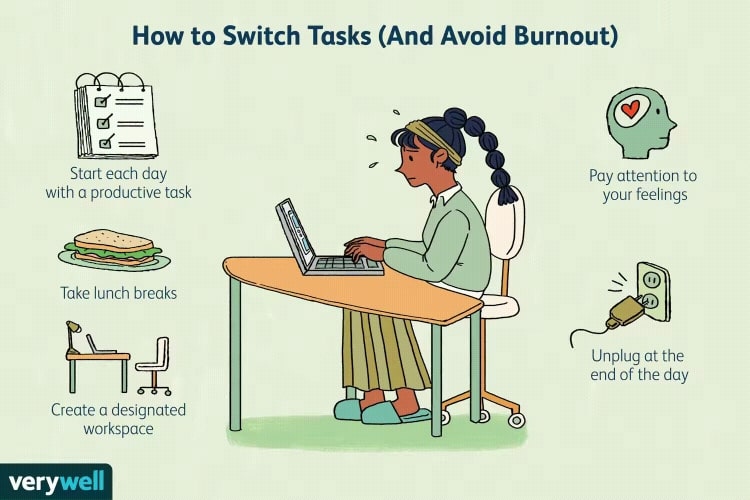In recent years, the way we work has changed dramatically, and for many of us, the idea of working from home has shifted from a rare luxury to a daily reality.
The COVID-19 pandemic acted as a catalyst, pushing countless businesses and employees to embrace remote work. Now, whether you’re sipping coffee in your pajamas or taking a midday break to walk your dog, the home office has become a familiar setting for millions.
The appeal of remote work is hard to resist. Imagine saying goodbye to the daily commute, enjoying a more flexible schedule, and creating a workspace that truly reflects your personality.
But while working from home offers fantastic perks, it also comes with its own set of challenges. Staying productive, setting boundaries, and keeping in touch with coworkers can sometimes feel like a juggling act.
In this article, we’re here to help you navigate the world of remote work and how to work from home with practical tips for creating a productive home office, maintaining a healthy work-life balance, and staying connected with your team.
Plus, we’ll introduce you to 50 amazing work-from-home jobs that can kickstart your journey to a fulfilling and flexible career.
Understanding Remote Work
Remote work has become a buzzword in recent years, but what exactly does it mean?
Let’s break it down in simple terms and explore why it’s become such a game-changer in the modern workplace.
What is Remote Work?
At its core, working remotely just means working outside a traditional office environment. This could mean working from your home office, a local coffee shop, or even while traveling the world as a digital nomad.

It’s also not necessarily a new concept. It’s been around in various forms for decades, but recent technological advancements have made it more accessible and efficient than ever before.
High-speed internet, cloud computing, and sophisticated collaboration tools have transformed the way we think about work.
The Impact of Remote Work
People are realizing that working remotely allows them greater control and flexibility over their lives. Less time commuting means more time for your personal life.
According to a recent study by Upwork, 22% of the American workforce is expected to work remotely by 2025. That’s a staggering 36.2 million people!
The shift to remote work has had far-reaching effects:
- For employees: It’s opened up new possibilities for work-life balance, reduced commute stress, and allowed people to live where they want rather than where their job is located.
- For employers: It’s expanded the talent pool, reduced overhead costs, and in many cases, increased productivity.
- For society: It’s led to reduced traffic congestion in cities and potentially lower carbon emissions from commuting.
Types of Remote Work
Remote work isn’t one-size-fits-all. It comes in various flavors to suit different needs and lifestyles:
- Full-time remote: This is when your entire job is done remotely, with no expectation to come into a physical office.
- Hybrid remote: A mix of remote and in-office work. You might work from home a few days a week and go into the office for the rest.
- Freelance or contract remote work: This involves working on projects for various clients, all from the comfort of your home office.
- Flexible remote: Some companies allow employees to work remotely as needed, offering flexibility for personal appointments or the occasional work-from-home day.
- Owning your own business: This is generally the most flexible and can include any or all types of the above work structures because you can usually set your own working hours.
50 Great Work-From-Home Jobs
As remote employees become a larger and larger portion of the workforce, a diverse range of work-from-home jobs have become available across various industries.
Here’s a list of 50 great work-from-home jobs to consider, organized by category, along with brief descriptions of each role.
Tech and IT
- Software Developer -Software developers design and build applications or systems. They often work with programming languages like Java, Python, or JavaScript to create software solutions for clients or companies.
- Web Designer -Web designers focus on the visual aspects of websites, ensuring they are user-friendly and aesthetically pleasing. They typically use design software and coding languages like HTML and CSS to create engaging online experiences.
- IT Support Specialist – IT support specialists troubleshoot technical issues for organizations or clients. They assist users with software and hardware problems, often providing support via phone, email, or chat.
- Data Analyst -Data analysts collect, process, and analyze data to help organizations make informed decisions. They use statistical tools and software to interpret complex data sets and present their findings.
- Cybersecurity Analyst – Cybersecurity analysts protect an organization’s computer systems and networks from cyber threats. They monitor for security breaches, implement security measures, and respond to incidents to safeguard sensitive information.
Related: 27 Jobs That Make a Lot of Money
Creative Roles

If you’re looking for a fun job that pays well, these creative roles provide a lot of flexibility and potential to own your own business.
- Graphic Designer -Graphic designers create visual content for various media, including websites, advertisements, and social media. They use design software to produce eye-catching graphics that communicate messages effectively.
- Content Writer -Content writers produce written material for websites, blogs, and marketing campaigns. They research topics, create engaging content, and optimize it for search engines to attract readers.
- Video Editor – Video editors assemble recorded footage into a polished final product. They use editing software to cut, arrange, and enhance videos for various purposes, including marketing, entertainment, and education.
- Animator -Animators create moving images and visual effects for films, video games, and online content. They use specialized animation software to bring characters and scenes to life through animation techniques.
- Social Media Manager -Social media managers develop and execute social media strategies for brands. They create content, engage with followers, and analyze performance metrics to enhance online presence.
- Digital Creator or Blogger – Digital creators and bloggers create content across platforms like personal blogs, YouTube, and social media, focusing on niches such as travel, fashion, or lifestyle. They build a loyal audience and monetize their work through advertising, sponsored posts, and affiliate marketing, allowing for creativity and flexibility in their careers.
Related: How to Get Started Blogging: The Ultimate Guide
Writing and Editing
- Freelance Writer-Freelance writers create content for various clients, including articles, blog posts, and marketing materials. They often specialize in specific niches and work on a project basis. Related: Full list of freelance writing websites.
- Editor -Editors review and refine written content for clarity, coherence, and style. They work with authors to enhance their work and ensure it meets publication standards. Related: Full list of editing jobs.
- Technical Writer -Technical writers produce documentation for complex subjects, such as user manuals or software guides. They translate technical information into clear, user-friendly content.
- Grant Writer -Grant writers research and write proposals to secure funding for organizations. They craft compelling narratives that align with the goals of funding agencies.
- Copywriter-Copywriters create persuasive content for advertising and marketing campaigns. They write copy for websites, ads, and promotional materials to attract and engage customers.
Related: 29 Great Ways to Make Money Writing Online
Marketing and Sales
- Digital Marketing Specialist -Digital marketing specialists develop and implement online marketing strategies. They focus on SEO, social media, email marketing, and content creation to drive traffic and increase brand awareness.
- SEO Consultant -SEO consultants optimize websites to improve their visibility in search engine results. They conduct keyword research, analyze site performance, and implement strategies to enhance organic traffic.
- Sales Representative -Sales representatives promote and sell products or services to customers. They build relationships, identify client needs, and close deals, often working remotely to reach a broader audience.
- Affiliate Marketer-Affiliate marketers earn commissions by promoting other companies’ products or services. They create content that drives traffic to affiliate links, generating sales and revenue.
- Email Marketer -Email marketing specialists design and execute email campaigns to engage customers. They analyze performance metrics and refine strategies to improve open and conversion rates.
Customer Service

While some of these types of jobs require prior customer service skills, it’s also a field that often has a lot of entry-level remote opportunities.
- Customer Support Representative -Customer support representatives assist customers with inquiries, complaints, and product information. They provide support via phone, email, or chat, ensuring a positive customer experience.
- Virtual Assistant -Virtual assistants provide administrative support to businesses or entrepreneurs remotely. Tasks may include scheduling appointments, managing emails, and handling customer inquiries.
- Call Center Representative -Call center representatives handle incoming and outgoing customer calls. They address customer needs, resolve issues, and provide information about products or services.
- Chat Support Agent -Chat support agents assist customers through live chat on websites. They answer questions, troubleshoot issues, and guide users in real-time, enhancing customer satisfaction.
- Technical Support Specialist -Technical support specialists help customers resolve technical issues with products or services. They diagnose problems and provide solutions, often working with software or hardware.
Related: 34 High-Paying Jobs With No Experience Necessary
Education and Training
- Online Tutor -Online tutors provide personalized instruction to students in various subjects. They use video conferencing tools to conduct lessons and help students improve their understanding of the material.
- Curriculum Developer -Curriculum developers design educational programs and materials for schools or online courses. They create lesson plans, assessments, and instructional resources to enhance learning experiences.
- E-learning Instructor -E-learning instructors teach courses online, often using learning management systems. They engage with students through video lectures, discussions, and interactive activities.
- Language Teacher -Language teachers instruct students in foreign languages through online platforms. They develop lesson plans, conduct virtual classes, and assess student progress.
- Test Prep Instructor – Test prep instructors help students prepare for standardized tests, such as the SAT or GRE. They provide strategies, practice materials, and personalized coaching to improve test performance.
Related: 22 Low-Stress Jobs That Pay Well
Administrative and Support

Administrative and support jobs usually fall under the category of typing jobs and often have a lot of remote employees because the work can be done from anywhere with a computer.
- Executive Assistant -Executive assistants provide high-level administrative support to executives. They manage schedules, coordinate meetings, and handle correspondence, ensuring smooth operations.
- Data Entry Clerk -Data entry clerks input and manage data for organizations. They ensure accuracy and efficiency in maintaining databases and records, often using spreadsheets and software.
- Transcriptionist -Transcriptionists convert audio or video recordings into written text. They listen to recordings and accurately transcribe content for various purposes, including legal or medical documentation. Related: Full list of transcription jobs.
- Proofreader -Proofreaders review written content for errors in grammar, spelling, and punctuation. They ensure that documents are polished and ready for publication or distribution. Related: Full list of proofreading jobs.
- Project Coordinator – Project coordinators assist in managing projects by organizing tasks, timelines, and resources. They communicate with team members and stakeholders to ensure project goals are met.
Related: 22 Best Online Job for Teens
Health and Wellness
- Telehealth Nurse – Telehealth nurses provide medical advice and support to patients remotely. They assess patient needs, offer guidance, and coordinate care through virtual consultations.
- Online Therapist – Online therapists offer mental health support through video or chat sessions. They provide counseling and therapy to clients, helping them navigate emotional challenges.
- Wellness Coach -Wellness coaches guide clients in achieving their health and wellness goals. They develop personalized plans and provide ongoing support to encourage healthy lifestyle changes.
- Nutrition Consultant -Nutrition consultants advise clients on dietary choices and meal planning. They assess individual needs and create tailored nutrition plans to promote overall health.
- Fitness Instructor -Fitness instructors lead virtual workout classes, offering guidance and motivation to participants. They design routines and adapt exercises for various fitness levels.
Related: 30 Best Stay-At-Home Mom Jobs That Pay $25+/Hr
Finance and Accounting
- Bookkeeper -Bookkeepers manage financial records for businesses, ensuring accuracy in transactions and reports. They handle invoicing, payroll, and account reconciliations.
- Financial Analyst -Financial analysts assess financial data to help organizations make informed decisions. They analyze trends, prepare reports, and provide recommendations for improving financial performance.
- Tax Preparer -Tax preparers assist individuals and businesses in filing their taxes. They ensure compliance with tax laws and help clients maximize deductions and credits.
- Accountant -Accountants prepare and analyze financial statements, manage budgets, and ensure compliance with regulations. They may work for firms or as independent consultants.
- Financial Planner -Financial planners help clients develop strategies to achieve their financial goals. They assess individual circumstances and create personalized plans for savings, investments, and retirement.
Miscellaneous
- Voice Actor – Voice actors provide voiceovers for various media, including commercials, animations, and audiobooks. They use their vocal skills to bring characters and narratives to life.
- Online Survey Taker -Online survey takers participate in market research by providing feedback on products and services. This flexible role allows individuals to earn money by sharing their opinions.
- Virtual Event Planner -Virtual event planners organize and coordinate online events, such as webinars and conferences. They manage logistics, marketing, and attendee engagement to ensure successful events.
- Online Researcher -Online researchers gather information on specific topics for businesses, writers, or academics. They analyze data and present findings in a clear and organized manner.
- Podcast Producer – Podcast producers manage the production of audio content, including planning, recording, and editing episodes. They work with hosts and guests to create engaging and informative podcasts.
Related: 27 Same-Day Pay Jobs: Sign Up and Get Paid
When considering these work-from-home jobs, keep in mind that some may require specific qualifications, experience, or training. Salaries can also vary widely based on factors such as experience, location, and the specific employer.
You can also look for more positions on job board websites like Indeed or FlexJobs.
Next, we will share some remote work tips on how to get started and stay productive in your new remote position.
How to Transition to a Remote Job
Transitioning to remote work can be exciting, but it also requires careful planning and organization to ensure you thrive in your new environment.
1. Create a Dedicated Workspace

One of the most crucial aspects of working from home is having a dedicated workspace.
This helps you mentally separate work from personal life, making it easier to focus and remain productive throughout the day. Here are some tips for creating an effective workspace:
- Find a Quiet Spot: Choose a location in your home that minimizes distractions. Ideally, this should be away from high-traffic areas and noise.
- Ergonomic Setup: Invest in a comfortable chair and desk that promote good posture. Your workspace should be conducive to long hours of work without causing strain.
- Personal Touches: Decorate your workspace with items that inspire you, such as plants, artwork, or motivational quotes. A pleasant environment can boost your mood and creativity.
- Good Lighting: Ensure your workspace has ample natural light to reduce eye strain, improve your overall mood, and look good on video calls, if necessary.
- Minimize Distractions: Identify potential distractions in your home and find ways to mitigate them. This might mean setting boundaries with family members or using noise-canceling headphones.
Remote workers who have a home office can also deduct home office expenses on their tax return (in some cases).
2. Establish a Routine
Creating a structured routine is key to maintaining productivity while working from home. Here’s how to establish a routine that works for you:
- Set Work Hours: Define your working hours and stick to them. This helps create a clear boundary between work and personal time.
- Create Morning Rituals: Start your day with a consistent morning routine that prepares you for work. This could include exercise, meditation, or a good breakfast.
- Take Breaks: Schedule regular breaks throughout your day to recharge. Short breaks can enhance focus and prevent burnout.
Having set work hours not only helps you stay organized but also signals to others when you are available. Communicate your schedule to family and friends to minimize interruptions during work hours.
Taking breaks allows you to step away from your screen, stretch, and refresh your mind, ultimately enhancing your productivity and mental health.
3. Utilize the Tools and Technology

To work effectively from home, you need the right tools at your disposal. Here are some essential categories of tools to consider:
- Communication Tools: Platforms like Slack, Microsoft Teams, and Zoom are vital for staying connected with colleagues. They facilitate quick communication and virtual meetings.
- Project Management Software: Tools like Trello, Asana, or Monday help you manage tasks and projects efficiently, keeping everyone on the same page.
- Time Management Apps: Consider using apps like Toggl or RescueTime to track your time and stay accountable.
- Reliable Internet Connection: A strong and stable internet connection is non-negotiable. Consider upgrading your plan if you experience frequent disruptions.
- Quality Headphones: Invest in a good-quality headset or headphones for clear audio during calls and meetings. This can significantly improve communication and reduce background noise.
- Cloud Storage Solutions: Use services like Google Drive, Dropbox, or OneDrive to store and share files securely, ensuring you can access your work from anywhere.
Maximizing Productivity with Remote Working
Working from home offers incredible flexibility, but it also comes with unique challenges to staying focused and productive.
In this section, we’ll explore effective strategies to help you make the most of your remote work experience.
Time Management Techniques
Below are a few strategies for time management and staying focused to avoid distractions.
- Create a To-Do List: Start each day by listing your tasks in order of priority. This helps you stay organized and focused on what’s most important.
- Use the Two-Minute Rule: If a task takes less than two minutes to complete, do it immediately. This prevents small tasks from piling up and becoming overwhelming.
- Implement the ‘Eat the Frog’ Technique: Tackle your most challenging or least appealing task first thing in the morning when your energy and focus are at their peak.
- Set Boundaries with Social Media: Consider using website blockers or apps that limit your social media usage during work hours.
- Pomodoro Technique: Work in focused 25-minute intervals (called “Pomodoros”), followed by short 5-minute breaks. After four Pomodoros, take a longer 15-30 minute break.
- Time Blocking: Allocate specific time blocks for different tasks or types of work. This helps create structure in your day and allows for deep focus on one task at a time.
Communication Best Practices
Clear communication is crucial when working remotely. Here are some tips to improve your virtual communication:
- Be Proactive: Don’t wait for others to reach out. If you need information or clarification, ask for it promptly.
- Use the Right Channel: Choose the appropriate communication method based on the urgency and complexity of the message. For quick questions, use chat; for more detailed discussions, opt for video calls.
- Practice Active Listening: During virtual meetings, give your full attention and use verbal and non-verbal cues to show you’re engaged.
- Prepare an Agenda: Share a clear agenda before the meeting to keep discussions focused and productive.
- Test Your Tech: Check your audio, video, and internet connection before important calls to avoid technical hiccups.
- Encourage Participation: In group meetings, create opportunities for everyone to contribute. This can be through round-robin updates or specifically asking for input from quieter team members.
Work-Life Balance
Below are some strategies to separate work from personal life.
- Create Physical Boundaries: If possible, have a separate room for your office. If not, use room dividers or even a specific desk that’s only for work.
- Establish a Shutdown Ritual: Develop an end-of-day routine that signals the transition from work to personal time. This could involve tidying your desk, reviewing your accomplishments for the day, or simply shutting down your computer.
- Use Different Devices: If feasible, use separate devices for work and personal use to create a clear division.
Recognizing Signs of Burnout and How to Address Them

Burnout can be a real risk when working from home. Here are some signs to watch out for:
- Feeling constantly exhausted
- Lack of motivation
- Increased irritability
- Difficulty concentrating
If you notice these signs, consider these steps:
- Take a Break: Step away from work for a short period. Even a day off can help reset your mindset.
- Reassess Your Workload: Are you taking on too much? Speak with your manager about prioritizing tasks or redistributing work if necessary.
- Practice Self-Care: Prioritize activities that recharge you, whether it’s exercise, meditation, or spending time with loved ones.
- Seek Support: Don’t hesitate to reach out to colleagues, friends, or a professional if you’re struggling with burnout.
Remember, productivity isn’t about working non-stop. It’s about working smarter, maintaining a healthy balance, and taking care of your well-being.
FAQs on Remote Jobs
Conclusion
The rise of remote work has fundamentally changed the way we approach our careers, offering unprecedented flexibility and opportunities for individuals across various industries.
As more companies embrace this model, the potential for work-from-home jobs continues to expand, making it an exciting time to explore new possibilities.
While remote workers have a lot of benefits and flexibility, not everyone thrives in this environment. The working hours may not be any more flexible than if you were to work in an office and family distractions can impact your ability to work efficiently.
The best way to set yourself up for success is to ensure that you have a quiet, designated workspace and the right technology in place to allow you to do your job just as well as you could do it in an office.
The key to thriving in a remote work environment lies in adaptability, effective communication, and self-discipline.
As you consider the diverse range of remote job opportunities available, remember that the future of work is evolving. Embrace the changes, stay curious, and be open to learning new skills.
The world of remote work is not just a trend; it’s a revolution that can lead to a more balanced and enriching professional life.